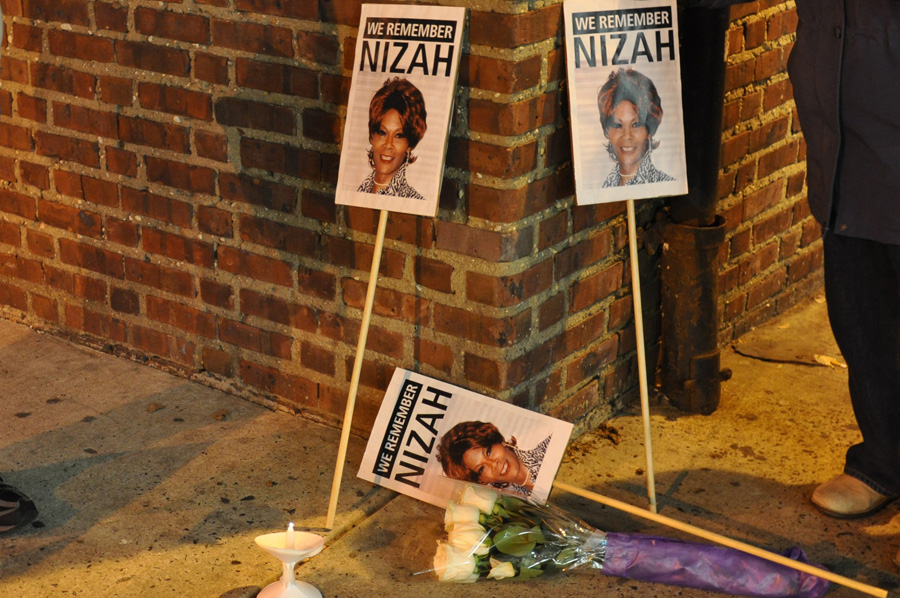When Philadelphia District Attorney Seth Williams agreed to attend next week’s Nizah Morris forum, he sent a ripple of hope for transparency in the case.
Numerous questions plague the Morris case that Williams may be able to answer. Advocates also hope he’ll lift a non-disclosure agreement preventing public access to dozens of Morris investigative records.
Morris was a trans woman found with a fatal head injury during the early-morning hours of Dec. 22, 2002, shortly after a Center City “courtesy ride” from Philadelphia police.
Her homicide remains unsolved, and advocates want a state probe.
Aspects of the case that require clarification include paperwork turned in by responding officers, missing and withheld evidence and communication gaps between police and the civilian-oversight community.
Police paperwork questioned
The paperwork turned in by officers who responded to Morris on the morning of her homicide has long been a source of concern.

Not only does the paperwork fail to document the courtesy ride and subsequent homicide, it contains speculation about Morris’ transgender status and ascribes two genders to her.
It’s unclear why the paperwork would contain any mention of Morris’ transgender status, since the officers supposedly thought Morris was simply a “hospital case,” not a hate-crime victim.
Another troubling aspect of the paperwork is a patrol log filled out by Officer Elizabeth Skala, who gave Morris the courtesy ride.
On its face, the log indicates that Skala was with Morris during the time period she was struck in the head with a blunt object.
In 2004 and 2006, Skala was questioned about her patrol log. She was informed that a 911 call about Morris’ head injury came in at 3:25 a.m., yet her patrol log indicates she was with Morris for about 16 minutes, until 3:26 a.m.
Skala was unable or unwilling to clarify the log and distance herself from Morris at the time of her fatal head wound.
Skala gave this response in 2004 to a question about her patrol log: “I never saw anybody lying in the middle of the street. I don’t have any part of that and time frame as of that and what I did. I only have the time frame of what I did.”
The activities of two other responding officers, Thomas Berry and Kenneth Novak, also remain murky during the time period when Morris was struck in the head.
Missing and withheld evidence
Many evidentiary items are missing in the Morris case, including video-surveillance tapes, key 911 transmissions, a complete dispatch record, search warrants, cell-phone records and Morris’ clothing.
Advocates hope that some of this evidence will surface, noting the police department’s Morris homicide file was located in the city’s Archives Unit, after being misplaced for about eight years.
If a homicide file can be located in an Archives Unit after being misplaced for eight years, there’s hope that other missing evidence will surface at some point, advocates say.
Additionally, there are dozens of Morris investigative records that have been retained by the D.A.’s Office, yet remain off-limits to the public.
The Police Advisory Commission obtained photocopies of many of these records. But due to a non-disclosure agreement between the D.A.’s Office and the PAC, the public can’t access the records.
Last year, Williams was asked if he would lift the non-disclosure agreement to enable public access to the records.
Williams said he would consider doing so. But as of presstime, the records remain unavailable to the public.
The complete police Internal Affairs investigation file for the Morris incident also remains unavailable to the public. Advocates for Morris want the police to release this file as well.
Police have agreed to send a representative to next week’s Morris forum, and the topic of the Internal Affairs file is expected to be raised.
Improved dialogue with law enforcement
If nothing else, the Morris case spotlights the need for better communication between police and the Police Advisory Commission, a civilian-oversight agency.
During the early stages of its Morris review, the PAC was repeatedly assured by police that Morris’ homicide was thoroughly investigated. The PAC’s initial Morris opinion, issued in 2007, duly noted those assurances.
It wasn’t until a private citizen informed the PAC that the entire police homicide file was missing that the PAC reopened the case and issued a new opinion in 2013 — calling for state and federal probes.
Police have never explained why it was left to a private citizen to inform the PAC of the missing Morris homicide file.
Additionally, police haven’t explained why the PAC conducted its Morris review with a partial police report, partial 911 transmissions and partial dispatch records.
This lack of comprehensive information hindered the PAC’s ability to ask probing questions of the police, and contributed to a problematic PAC opinion in 2007.
The Morris case also spotlights the need for better communication between police and the LGBT community.
In 2009, then-State Rep. Babette Josephs asked Police Commissioner Charles H. Ramsey to assign a detective to the Morris case. To this day, Ramsey hasn’t replied to Josephs’ letter.
If there is a homicide detective assigned to the Morris case, his or her name hasn’t been divulged.
As a result, no police official is publicly identified as a knowledgeable person who can field questions about the Morris case — a situation that contributed to advocates’ calls for an outside probe.
The Morris forum will take place 6-8 p.m. April 15 at William Way LGBT Community Center, 1315 Spruce St. The event is free and open to the public.
